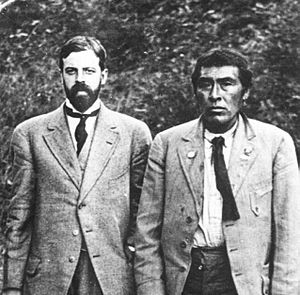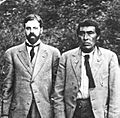Alfred Kroeber facts for kids
Quick facts for kids
Alfred Kroeber
|
|
|---|---|

Kroeber with Ishi in 1911
|
|
| Born |
Alfred Louis Kroeber
June 11, 1876 |
| Died | October 5, 1960 (aged 84) Paris, France
|
| Alma mater | Columbia University |
| Spouse(s) |
|
| Children | 4, including Karl and Ursula |
| Awards | Viking Fund Medal (1946) |
| Scientific career | |
| Institutions | University of California, Berkeley |
| Doctoral advisor | Franz Boas |
| Doctoral students | Cora Du Bois, Margaret Lantis, Katharine Luomala, Laura Maud Thompson, Charles F. Voegelin, |
| Influenced | H. Stuart Hughes |
Alfred Louis Kroeber (born June 11, 1876 – died October 5, 1960) was an important American cultural anthropologist. An anthropologist is a scientist who studies human societies and cultures. Kroeber was the first person to earn a PhD in anthropology from Columbia University in 1901.
He also became the first professor in the Anthropology Department at the University of California, Berkeley. He helped create the Phoebe A. Hearst Museum of Anthropology and was its director for many years. Kroeber is well-known for his studies of Ishi, who was believed to be the last surviving member of the Yahi people. He was also the father of the famous writer Ursula K. Le Guin.
Contents
About Alfred Kroeber's Life
Alfred Kroeber was born in Hoboken, New Jersey. His parents were from Germany. His family moved to New York City when he was young. He was taught at home and went to private schools.
Kroeber grew up speaking German at home. He also learned Latin and Greek in school. This started his lifelong interest in languages. He went to Columbia College at age 16. He first studied English and drama.
Later, he changed his focus to the new field of anthropology. He earned his PhD in 1901. His studies focused on the Arapaho people. This was the first anthropology doctorate given by Columbia University.
Kroeber spent most of his career in California. He worked at the University of California, Berkeley. He was a professor and the director of the University of California Museum of Anthropology. He retired from Berkeley in 1946. Kroeber passed away in Paris, France, in 1960.
Family Life
Alfred Kroeber married Henriette Rothschild in 1906. She became ill and passed away in 1913.
In 1926, he married Theodora Kracaw Brown. She had been one of his students. They had two children together. Their son was Karl Kroeber, a literary critic. Their daughter was Ursula Kroeber Le Guin, a famous science fiction writer. Alfred also adopted Theodora's two sons from her first marriage.
After Alfred's death, Theodora Kroeber wrote a book about his life. It was called Alfred Kroeber: A Personal Configuration.
Kroeber's Impact on Anthropology
Kroeber is mostly known for studying cultures. But he also did important work in archaeology and anthropological linguistics. Archaeology is the study of human history through digging up old sites. Linguistics is the study of language. He helped connect these fields. He led digs in places like New Mexico, Mexico, and Peru.
Kroeber and his students gathered a lot of information about Native American tribes in the western United States. His book, Handbook of the Indians of California (1925), shared much of this knowledge. In this book, he described how some California groups were organized. They were smaller than a typical tribe. He called these groups "tribelets."
Kroeber also helped develop ideas like "culture area" and "cultural configuration." A culture area is a region where people share similar cultural traits. He also wrote about "cultural fatigue." This idea suggests that cultures can become tired or less creative over time.
Many people saw Kroeber as a leader in his field. He was called the "Dean of American Anthropologists." He worked with Roland B. Dixon to group Native American languages together. They identified language families like Penutian and Hokan.
One of his most famous works was with Ishi. Ishi was believed to be the last Yahi Indian from California. Kroeber's second wife, Theodora, wrote a popular book about Ishi called Ishi in Two Worlds. Their relationship was even shown in a movie called The Last of His Tribe (1992).
Kroeber's textbook, Anthropology, was used by many students for years. He also wrote Configurations of Cultural Growth (1944). In this book, he suggested that great thinkers and artists appear when a culture is ready for them. He believed genius comes from the culture itself, not just from one special person.
A friend described Kroeber as a "good listener." He was able to understand other people's points of view. He was sincere and simple, which helped him connect with people from different cultures.
Work on Indian Land Claims
Kroeber played a role in legal cases about Native American land. He was the main researcher for the Native American groups in a land claim case against the United States. His work helped set the standard for how experts would present information in these types of cases. Many of his former students also became experts in similar land claims.
Awards and Achievements
Alfred Kroeber received many honors for his work:
- He was a Fellow of the American Academy of Arts and Sciences (1912).
- He received five honorary degrees from different universities.
- He was given two gold medals.
- He was an honorary member of 16 scientific groups.
- He served as President of the American Anthropological Association from 1917 to 1918.
Images for kids
See also
 In Spanish: Alfred Kroeber para niños
In Spanish: Alfred Kroeber para niños


